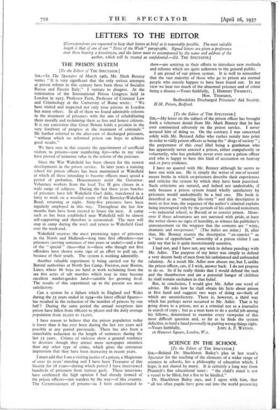[To the Editor of THE SPECTATOR.] Sm,—My letter on the
subject of the prison officer has brought forth a vehement denial from Mr. Mark Burney that he has ever commented adversely on the prison service. I never accused him of doing so. On the contrary. I was concerned solely with Mr. Bernard Adler who rushes noisily into print in order to vilify prison officers as being the " dregs of society " ; the perpetrator of this cruel libel being a gentleman who has apparently never entered a prison, either compulsorily or voluntarily, who has probably never even seen a prison. officer and who is happy to base this kind of accusation on hearsay and ex parte evidence.
I have no quarrel with Mr. Benney although he seems to have one with me. He is simply the writer of one of several recent books in which ex-prisoners describe their experiences and criticise the system by which they have been punished. Such criticisms are natural, and indeed not undesirable, if only because a prison system found wholly satisfactory by prisoners would undoubtedly be a bad one. His book is described as an " amazing life-story " and this description is more or less true, the sequence of the author's criminal exploits being interrupted only by the periods of his enforced retirement —to industrial school, to Borstal or to convict prison. More- over if these adventures are not narrated with pride, at least the writer shows no signs of humility, as witness his publisher's announcement on the wrapper that the contents are " witty, dramatic and unrepentant." (The italics are mine.) If, after that, Mr. Benitey resents the description " ex-convict " as a " term of opprobrium " unworthy of a prison visitor I can only say that he is quite inconsistently sensitive.
I had not, and I have not, any wish to debate penology with Mr. Adler. The purpose of my letter was simply to defend a very decent body of men from his unbalanced and unfounded calumny. As a result Mr. Adler now abuses me, but I, unlike the prison officer, can, if I wish, answer back. I do not propose to do so. So if he really thinks that I would defend the rack and the thumbscrew and am a potential hanger of children he shall remain unshaken in that belief.
But, in conclusion, I would give Mr. Adler one word of advice. He asks how he shall obtain his facts about prison at first hand and suggests two ways of doing so—both of which are unsatisfactory. There is, however, a third way which has perhaps never occurred to Mr. Adler. That is by going down to a prison, not as a criminal nor as a journalist in search of copy ; but as a man keen to do a useful job among his fellows, determined to examine every viewpoint of this most difficult question and, so far as he finds the system defective, to lend a hand personally in putting wrong things right.
—Yours faithfully, JOHN A. F. WATSON. z6 Hanover Square, London, W.z.






















































 Previous page
Previous page